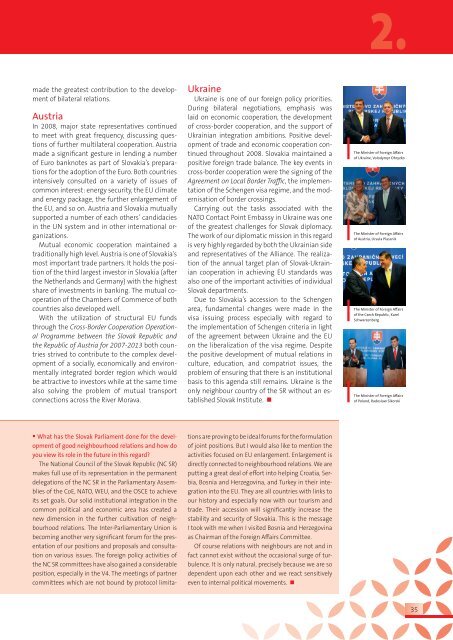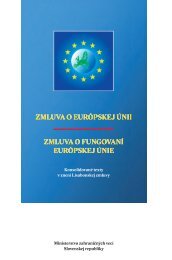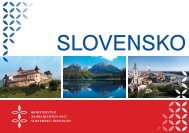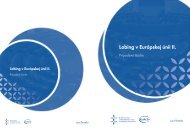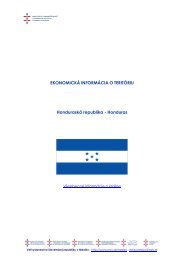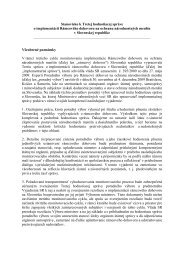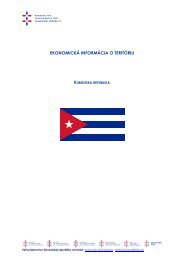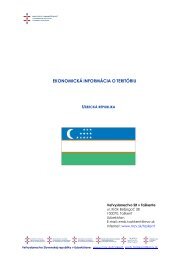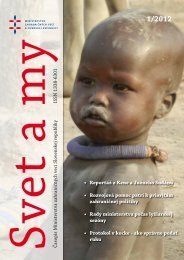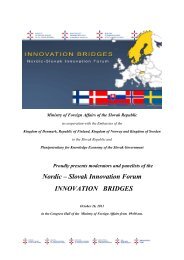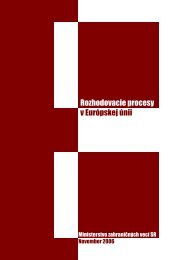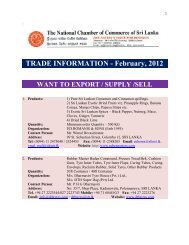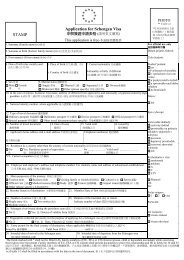Annual Report Ministry of Foreign Affairs of the Slovak Republic 2008
Annual Report Ministry of Foreign Affairs of the Slovak Republic 2008
Annual Report Ministry of Foreign Affairs of the Slovak Republic 2008
Create successful ePaper yourself
Turn your PDF publications into a flip-book with our unique Google optimized e-Paper software.
2.<br />
made <strong>the</strong> greatest contribution to <strong>the</strong> development<br />
<strong>of</strong> bilateral relations.<br />
Austria<br />
In <strong>2008</strong>, major state representatives continued<br />
to meet with great frequency, discussing questions<br />
<strong>of</strong> fur<strong>the</strong>r multilateral cooperation. Austria<br />
made a significant gesture in lending a number<br />
<strong>of</strong> Euro banknotes as part <strong>of</strong> <strong>Slovak</strong>ia’s preparations<br />
for <strong>the</strong> adoption <strong>of</strong> <strong>the</strong> Euro. Both countries<br />
intensively consulted on a variety <strong>of</strong> issues <strong>of</strong><br />
common interest: energy security, <strong>the</strong> EU climate<br />
and energy package, <strong>the</strong> fur<strong>the</strong>r enlargement <strong>of</strong><br />
<strong>the</strong> EU, and so on. Austria and <strong>Slovak</strong>ia mutually<br />
supported a number <strong>of</strong> each o<strong>the</strong>rs’ candidacies<br />
in <strong>the</strong> UN system and in o<strong>the</strong>r international organizations.<br />
Mutual economic cooperation maintained a<br />
traditionally high level. Austria is one <strong>of</strong> <strong>Slovak</strong>ia’s<br />
most important trade partners. It holds <strong>the</strong> position<br />
<strong>of</strong> <strong>the</strong> third largest investor in <strong>Slovak</strong>ia (after<br />
<strong>the</strong> Ne<strong>the</strong>rlands and Germany) with <strong>the</strong> highest<br />
share <strong>of</strong> investments in banking. The mutual cooperation<br />
<strong>of</strong> <strong>the</strong> Chambers <strong>of</strong> Commerce <strong>of</strong> both<br />
countries also developed well.<br />
With <strong>the</strong> utilization <strong>of</strong> structural EU funds<br />
through <strong>the</strong> Cross-Border Cooperation Operational<br />
Programme between <strong>the</strong> <strong>Slovak</strong> <strong>Republic</strong> and<br />
<strong>the</strong> <strong>Republic</strong> <strong>of</strong> Austria for 2007-2013 both countries<br />
strived to contribute to <strong>the</strong> complex development<br />
<strong>of</strong> a socially, economically and environmentally<br />
integrated border region which would<br />
be attractive to investors while at <strong>the</strong> same time<br />
also solving <strong>the</strong> problem <strong>of</strong> mutual transport<br />
connections across <strong>the</strong> River Morava.<br />
Ukraine<br />
Ukraine is one <strong>of</strong> our foreign policy priorities.<br />
During bilateral negotiations, emphasis was<br />
laid on economic cooperation, <strong>the</strong> development<br />
<strong>of</strong> cross-border cooperation, and <strong>the</strong> support <strong>of</strong><br />
Ukrainian integration ambitions. Positive development<br />
<strong>of</strong> trade and economic cooperation continued<br />
throughout <strong>2008</strong>. <strong>Slovak</strong>ia maintained a<br />
positive foreign trade balance. The key events in<br />
cross-border cooperation were <strong>the</strong> signing <strong>of</strong> <strong>the</strong><br />
Agreement on Local Border Traffic, <strong>the</strong> implementation<br />
<strong>of</strong> <strong>the</strong> Schengen visa regime, and <strong>the</strong> modernisation<br />
<strong>of</strong> border crossings.<br />
Carrying out <strong>the</strong> tasks associated with <strong>the</strong><br />
NATO Contact Point Embassy in Ukraine was one<br />
<strong>of</strong> <strong>the</strong> greatest challenges for <strong>Slovak</strong> diplomacy.<br />
The work <strong>of</strong> our diplomatic mission in this regard<br />
is very highly regarded by both <strong>the</strong> Ukrainian side<br />
and representatives <strong>of</strong> <strong>the</strong> Alliance. The realization<br />
<strong>of</strong> <strong>the</strong> annual target plan <strong>of</strong> <strong>Slovak</strong>-Ukrainian<br />
cooperation in achieving EU standards was<br />
also one <strong>of</strong> <strong>the</strong> important activities <strong>of</strong> individual<br />
<strong>Slovak</strong> departments.<br />
Due to <strong>Slovak</strong>ia’s accession to <strong>the</strong> Schengen<br />
area, fundamental changes were made in <strong>the</strong><br />
visa issuing process especially with regard to<br />
<strong>the</strong> implementation <strong>of</strong> Schengen criteria in light<br />
<strong>of</strong> <strong>the</strong> agreement between Ukraine and <strong>the</strong> EU<br />
on <strong>the</strong> liberalization <strong>of</strong> <strong>the</strong> visa regime. Despite<br />
<strong>the</strong> positive development <strong>of</strong> mutual relations in<br />
culture, education, and compatriot issues, <strong>the</strong><br />
problem <strong>of</strong> ensuring that <strong>the</strong>re is an institutional<br />
basis to this agenda still remains. Ukraine is <strong>the</strong><br />
only neighbour country <strong>of</strong> <strong>the</strong> SR without an established<br />
<strong>Slovak</strong> Institute. <br />
The Minister <strong>of</strong> <strong>Foreign</strong> <strong>Affairs</strong><br />
<strong>of</strong> Ukraine, Volodymyr Ohryzko<br />
The Minister <strong>of</strong> <strong>Foreign</strong> <strong>Affairs</strong><br />
<strong>of</strong> Austria, Ursula Plassnik<br />
The Minister <strong>of</strong> <strong>Foreign</strong> <strong>Affairs</strong><br />
<strong>of</strong> <strong>the</strong> Czech <strong>Republic</strong>, Karel<br />
Schwarzenberg<br />
The Minister <strong>of</strong> <strong>Foreign</strong> <strong>Affairs</strong><br />
<strong>of</strong> Poland, Radoslaw Sikorski<br />
What has <strong>the</strong> <strong>Slovak</strong> Parliament done for <strong>the</strong> development<br />
<strong>of</strong> good neighbourhood relations and how do<br />
you view its role in <strong>the</strong> future in this regard?<br />
The National Council <strong>of</strong> <strong>the</strong> <strong>Slovak</strong> <strong>Republic</strong> (NC SR)<br />
makes full use <strong>of</strong> its representation in <strong>the</strong> permanent<br />
delegations <strong>of</strong> <strong>the</strong> NC SR in <strong>the</strong> Parliamentary Assemblies<br />
<strong>of</strong> <strong>the</strong> CoE, NATO, WEU, and <strong>the</strong> OSCE to achieve<br />
its set goals. Our solid institutional integration in <strong>the</strong><br />
common political and economic area has created a<br />
new dimension in <strong>the</strong> fur<strong>the</strong>r cultivation <strong>of</strong> neighbourhood<br />
relations. The Inter-Parliamentary Union is<br />
becoming ano<strong>the</strong>r very significant forum for <strong>the</strong> presentation<br />
<strong>of</strong> our positions and proposals and consultation<br />
on various issues. The foreign policy activities <strong>of</strong><br />
<strong>the</strong> NC SR committees have also gained a considerable<br />
position, especially in <strong>the</strong> V4. The meetings <strong>of</strong> partner<br />
committees which are not bound by protocol limitations<br />
are proving to be ideal forums for <strong>the</strong> formulation<br />
<strong>of</strong> joint positions. But I would also like to mention <strong>the</strong><br />
activities focused on EU enlargement. Enlargement is<br />
directly connected to neighbourhood relations. We are<br />
putting a great deal <strong>of</strong> effort into helping Croatia, Serbia,<br />
Bosnia and Herzegovina, and Turkey in <strong>the</strong>ir integration<br />
into <strong>the</strong> EU. They are all countries with links to<br />
our history and especially now with our tourism and<br />
trade. Their accession will significantly increase <strong>the</strong><br />
stability and security <strong>of</strong> <strong>Slovak</strong>ia. This is <strong>the</strong> message<br />
I took with me when I visited Bosnia and Herzegovina<br />
as Chairman <strong>of</strong> <strong>the</strong> <strong>Foreign</strong> <strong>Affairs</strong> Committee.<br />
Of course relations with neighbours are not and in<br />
fact cannot exist without <strong>the</strong> occasional surge <strong>of</strong> turbulence.<br />
It is only natural, precisely because we are so<br />
dependent upon each o<strong>the</strong>r and we react sensitively<br />
even to internal political movements. <br />
35


